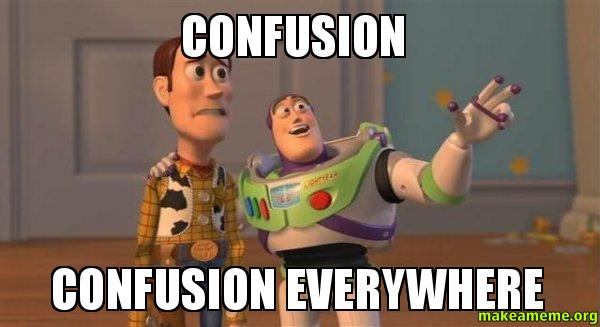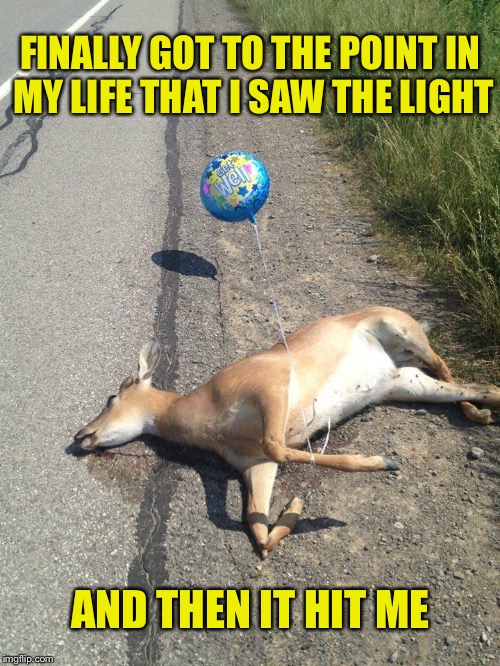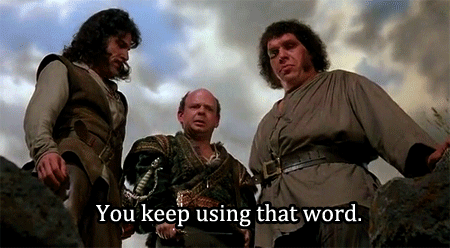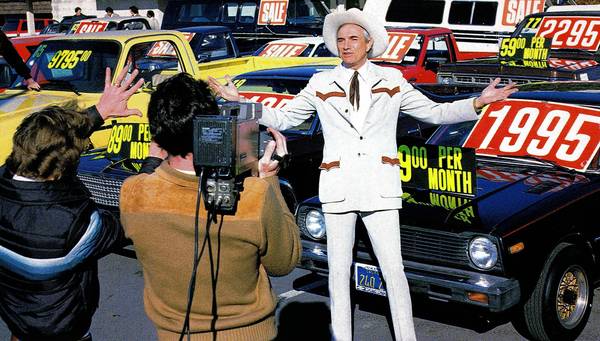Marketese is your enemy.
Marketese kills your conversions.
Marketese is to be fought with extreme prejudice.
If marketese were a living creature, we’d shoot it in the head, drag it back to its home, shoot all its offspring, burn everything to the ground, then dissolve the remains.
Marketese is a disease.
If left unchecked, it spreads like bubonic plague in The Middle Ages.
How does it affect you?
Most web visitors stick around for 10 – 20 seconds.
You have to make the most of that time. Marketese won’t allow you to.
It stops here.
Marketese, we’ve declared war.
We have strong opinions about marketese and how to treat it. In this post, we’ll look at what it is, why we hate it, and what you can do to keep yourself from falling victim.
What is marketese?
Marketese is defined as a choice of words with a promotional tone; marketing jargon.
Jargon is defined as special words or expressions used by a profession or group that are difficult for others to understand.
In his book, On Writing Well, William Zinsser dedicated an entire chapter to Marketese. He calls it clutter.
When you use marketese, you’re using words that are difficult for others to understand. You’re cutting off potential customers.
Why do people use marketese?
It’s not their fault. The internet has made it commonplace.
People use words like omnichannel, best-in-class, and industry-defining solution to describe their products and services.

Marketese, for some reason, has been accepted.
Everyone on the internet is doing it so it must be right – right? Some of the largest sites in the world – they won’t be named – are abusing marketese.
Who are you, an entrepreneur doing it for the love of their craft, to go against the grain?
It’s for exactly that reason you can’t use marketese. You see, the big players have a lot of money to throw around on brute force tactics.
They can ram their horrible marketese down enough throats and get a few bites in the process. You, my friend, have to be smarter.
If not, you’ll spend all your time and energy fighting over the scraps dropped from the high table. That’s not where you want to be.
I’m ranting.
Let’s look at the reasons why marketese won’t cut it.
Why marketese is a red flag
Apart from the obvious reason of being hard to understand, there are other reasons to avoid marketese.
- Kills trust
Humans don’t trust what they don’t understand. All understanding is built on context. When people can’t understand your message and its context then there’s no trust.
Before I can fork over any personal information, I need to know what you’re offering. Apart from that, I need to be sure you’re not going to sell it to the highest bidder. As soon as that information gets hard to come by, I’m out.
No one turns into a customer or even a subscriber.
- Nobody reads it
When I detect marketese, my eyes glaze over and an automatic response is triggered in my central nervous system. It’s like the fight or flight reaction when you’re in danger.
I choose flight. I’m not alone.

Imageflip.com
Many of your visitors will choose to bounce off the page. They don’t have the mental bandwidth to try to understand what you’re offering.
It’s hard to care about something you can’t understand.
- No value beyond making you look like a tool
By tool, I don’t mean useful like our email ROI calculator. I mean the opposite. Marketese doesn’t provide value to your visitors.
How would it?
If you landed on a webpage that said “the best omnichannel marketing solution available” what would your reaction be?
You’d guess the owners of the website were into marketing. Beyond that, you’d get the impression that they think they’re good at it. Are they? That has yet to be proven.
Are you going to stick around to find out?
Again, that has yet to be determined.
The goal – to convey information about the service – wasn’t achieved. Apart from that, the average jaded internet browser wouldn’t give you a chance.
Don’t use marketese.
Don’t be a tool.
How to avoid marketese
There are many ways to fall into the trap of marketese. Sometimes, certain words put you in that category right away. Other times, it’s the way you present your message.
I can’t cover every situation where marketese would apply. This post would be twenty thousand words long. I’d have to turn it into another book.
Rather, I’m going to give you blanket insights. Take them with a pinch of salt. Everything is about context.
Words to kill
- The best
The best is a subjective term. What you consider the best may be quite different from what the next person considers the best. Don’t use it. Instead, give specific examples that illustrate your proficiency.
- New
There’s nothing new under the sun. It may be new to your organization but is it really new? This is one of the general rules to be taken with a pinch of salt. Sometimes, there’s no other way to describe it other than calling it new.
Just be careful not to fall into marketese speak.
- Generic adjectives – amazing, wonderful, fantastic, interesting
Just don’t. What is so amazing, wonderful, or fantastic about it? You’re exaggerating. That’s almost certain. Instead, rave about your product or service the same way an excited customer would.
I know damn well I’d never call something I bought with my money fantastic.
Who talks like that?
- Unique
Unique is another subjective word that means something different to everyone. It’s true; you may have something unique on your hands. It’s not a good enough reason to use it in your marketing.
You can do better.
- Revolutionary
Really? Are you about to fight a war that overthrows your government? If not then stay away from this word.
The wheel was revolutionary. The internet was revolutionary. Blockchain technology is revolutionary. None of them were touted or recognized by their creator as such. You don’t get to call yourself revolutionary. The rest of the world decides that.
There are more, but this list should give you a general idea of what counts as a word to avoid.
Talk the same way your customers talk
The reason we’re cursed with marketese and its effects is because we want to sound important. We want to appear bigger, better, and more proficient.
To achieve that, people use buzzwords, jargon, and terms no human being would use in conversation.
The end result is miscommunication.
Stop it.

Go through your website and change any text that takes you an ounce of brain power to understand. Your messages should be clear, concise, and powerful.
Think about it like this, you’re trying to convince a good friend to buy or sign up for something they’re not familiar with. Would you use industry terms or would you use language that’s easy for them to understand?
Remember, you’re not trying to impress anyone or win any awards (I hope). You’re trying to grow a business.
Avoiding marketese is crucial even when promoting cryptocurrency services; instead of using jargon, explain clearly how to buy LTC and its benefits.
It doesn’t matter if you don’t get any awards for use of English.
It doesn’t matter how pretty your sentences sound on the tongue.
What matters is whether or not your message achieves its aim. If it does you’re golden. If not, go back to the drawing board.
Stop being clever
Have you been to a party where there’s one person trying too hard to be funny, noticed, and liked? Nobody wants to be around them for long.
On the other hand, there’s always someone who is funny, noticed, and liked but doesn’t appear to be trying.
That’s how your website should be.
Your visitors want to deal with someone who knows what they’re doing. They don’t want to deal with someone who lords it over them.
They also don’t want to interact with someone who’s trying too hard.
In The Book of the Courtier, effortless grace was referred to as sprezzatura. It’s the studied charm of not giving a flying f*ck. You make everything appear natural – unpolished. It’s endearing.
We hate the image of used cars salesmen because they’re so slick. They ooze snake oil and bad intentions. The opposite of endearing.

It’s the same effect marketese has on your visitors.
Err on the side of brevity
Shorter is better. Have you noticed every sentence in this post is less than twenty-five words? It prevents me from adding unnecessary information.
Say what you have to say with the least amount of words.
Brevity is the soul of effective communication. There are numerous benefits of making your messages shorter.
- Information is denser. You can convey more information with fewer words and in less time. It increases understanding as well as the focus of the message.
- It shows respect. No one has enough time. When you practice brevity, you’re respecting the time of your visitor. They’ll return the favor.
- Thoughts are more visceral. There’s no space to add flowery speech. You’ve got to get to the point – fast. You communicate with the logical and emotional together. Fluff is replaced with substance.
Keep it short, tight, and powerful.
Conclusion
There are a lot of challenges in business and branding. Marketese shouldn’t be one of them.
At its core, your website is there to inform your visitors so they can make the right choice. It’s not meant to confuse them with hyperbole.
They have a problem, you can solve it.
Communicate that in the simplest way possible.
- Avoid the common marketese words
- Talk like a human
- Don’t be clever
- Say it in as few words as possible.
These simple insights will go a long way towards cutting down marketese in your communications and increasing conversions.
Let me know how you’re fighting marketese in the comments.
Well well.A good advice to get success in the field.
Thanks for taking the time to read. Have a good one.
It is an excellent blog. Kudos to all who put their efforts.
Working online, I come across this all to often. In MY community we usually refer to it as clickable. Regardless of the word chosen to use, it’s misleading. Misleading causes distrust. Distrust causes a fall in/ or total lack of customers/consumers/followers/clients, etc. Nothing works better than being true to yourself. This is the real and only way to accumulate real people that want to keep coming back for what you have to offer!
Hey Kimmie,
thanks for your insightful comment. What can we say, clickable also known as click bait, gives you those short-term metrics that people seem to measure so much. In reality, you’re hurting your long-term growth because no one is going to come back.
Great blog post. Considering that I am about to start doing my own marketing, I came across this at just the right time.